
Tradition-A Journal of Orthodox Jewish Thought
Scope & Guideline
Challenging Perspectives, Inspiring Inquiry
Introduction
Aims and Scopes
- Halakhic Analysis and Jewish Law:
The journal frequently publishes articles that delve into halakhic literature, providing insights into Jewish law, its application, and contemporary challenges faced by the Jewish community. - Jewish Philosophy and Theology:
Exploring the philosophical underpinnings of Jewish thought, the journal addresses theological questions, interpretations of sacred texts, and the works of prominent Jewish philosophers throughout history. - Cultural and Historical Studies:
The journal examines the historical evolution of Orthodox Judaism, including its cultural practices, interactions with modernity, and the impact of historical events on Jewish thought and identity. - Literary and Poetic Expressions:
With a focus on the literary contributions of Jewish thinkers and poets, the journal highlights the role of literature in articulating and preserving Jewish values and beliefs. - Interdisciplinary Approaches:
The journal encourages interdisciplinary scholarship that connects Jewish studies with fields such as ethics, sociology, and political science, fostering a broader understanding of Jewish life and thought.
Trending and Emerging
- Contemporary Ethical Dilemmas:
There is an increasing focus on ethical questions related to modern challenges, such as medical ethics, social justice, and the implications of technology on Jewish law and life. - Jewish Identity and Modernity:
Explorations of how Orthodox Jews navigate their identities in the context of modern society have become more prominent, addressing issues of assimilation, community dynamics, and cultural adaptation. - Interfaith Relations and Pluralism:
Emerging discussions on interfaith dialogue and pluralism reflect an increasing openness to engage with non-Jewish communities and the implications for Orthodox thought and practice. - Mental Health and Spirituality:
The intersection of mental health and spirituality is gaining traction, with articles exploring how Jewish teachings can provide support and guidance in addressing mental health issues. - Responses to Global Crises:
The journal is increasingly addressing the Jewish perspective on global crises, including political conflicts, pandemics, and social upheavals, demonstrating a commitment to relevant and timely discourse.
Declining or Waning
- Historical Biographies of Lesser-Known Figures:
There has been a noticeable decline in articles focusing on the biographies and contributions of less prominent rabbinic figures, indicating a possible shift towards more mainstream or widely recognized personalities in Jewish history. - Traditional Ritual Practices:
The journal appears to be moving away from discussions centered solely on traditional rituals and practices, opting instead for broader analyses that incorporate modernity and contemporary Jewish experiences. - Exclusively Theoretical Discussions:
There is a waning interest in purely theoretical discussions devoid of practical application. Recent publications tend to favor analyses that connect theory to lived experiences and contemporary issues. - Gender Roles in Historical Contexts:
While gender studies remain relevant, there seems to be a reduction in articles specifically addressing historical gender roles within Orthodox Judaism, possibly reflecting a shift towards more current discussions of gender in modern contexts.
Similar Journals

Zutot
Connecting Ideas in Arts, Humanities, and BeyondZutot is a distinguished academic journal published by BRILL, focusing on the multifaceted realms of Arts and Humanities, Cultural Studies, and Religious Studies. With ISSN 1571-7283 and E-ISSN 1875-0214, Zutot presents an invaluable platform for scholars seeking to explore innovative ideas and interdisciplinary approaches within these fields. Recognized within the Q4 category for its contributions to contemporary discourse, the journal ranks at the 44th percentile in Religious Studies and the 39th percentile in General Arts and Humanities, underscoring its relevance and the quality of research it publishes. Since its inception, Zutot has continued to facilitate critical dialogue and scholarship, thus acting as a crucial resource for researchers, professionals, and students alike. Its converged publication years from 2001 to 2004 and 2008 to 2024 further demonstrate its ongoing commitment to supporting rigorous academic inquiry.
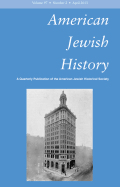
AMERICAN JEWISH HISTORY
Uncovering Narratives, Shaping IdentitiesAMERICAN JEWISH HISTORY is a premier academic journal published by Johns Hopkins University Press, dedicated to the exploration and analysis of the Jewish experience in the American context. With ISSN 0164-0178 and E-ISSN 1086-3141, this journal serves as a vital resource for scholars and students in the fields of cultural studies, history, and religious studies, as evidenced by its placement in the Q3 quartile across these disciplines in 2023. Reaching a broad audience interested in the historical, social, and cultural dimensions of the American Jewish narrative, the journal has converged in various years, ensuring a robust collection of multidisciplinary research and discussions. Although it operates under a traditional subscription model, the journal remains an essential platform for critical analysis, fostering deeper understanding of Jewish identity and history. With Scopus rankings placing it at the 60th percentile in History and 62nd percentile in Religious Studies, AMERICAN JEWISH HISTORY stands as a respected publication that significantly contributes to the discourse surrounding Jewish history and culture in the United States.
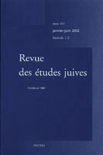
REVUE DES ETUDES JUIVES
Advancing Scholarship in Jewish Studies Since 1967REVUE DES ETUDES JUIVES, published by PEETERS, stands as a vital platform for scholarly discourse in the realms of Cultural Studies, History, Literature and Literary Theory, and Religious Studies. Based in Belgium, this journal, bearing the ISSN 0484-8616 and E-ISSN 1783-175X, has been faithfully chronicling research since its inception, with comprehensive coverage spanning from 1967, 1969, and several periods thereafter until 2023. Although categorized in Q4 quartiles across its fields—showing a diverse yet niche presence—it provides an invaluable space for emerging voices and established scholars to explore Jewish studies in a multidisciplinary context. Despite its compact impact factor and Scopus rankings reflecting its emerging status in the academic community, the journal is committed to fostering dialogue on the cultural and historical aspects of Jewish identity, offering a unique opportunity for researchers, professionals, and students to engage with contemporary and historical issues of Jewish significance. As a non-open access resource, it appeals to those seeking rigorous academic inquiry supported by Peeters' esteemed publishing acumen.
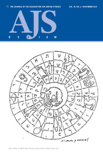
AJS Review-The Journal of the Association for Jewish Studies
Exploring Jewish Narratives and Heritage with Scholarly PrecisionAJS Review - The Journal of the Association for Jewish Studies is a leading academic journal published by the University of Pennsylvania Press, dedicated to advancing scholarship in Jewish studies. With its ISSN 0364-0094 and E-ISSN 1475-4541, the journal offers a rich compendium of research from various disciplines, including cultural studies, history, literature and literary theory, and religious studies. Recognized within the Q2 and Q3 quartiles across multiple categories in 2023, AJS Review provides an esteemed platform for academics to disseminate innovative ideas and engage with critical issues relevant to Jewish history and culture from 1976 to 2024. Although not an open-access journal, it ensures that high-quality, peer-reviewed articles are available to a global audience, enabling researchers, professionals, and students to foster deeper insights into Jewish narratives and heritage. By promoting interdisciplinary dialogue, AJS Review is integral to the academic community, offering valuable contributions to our understanding of Jewish studies and its broader implications.
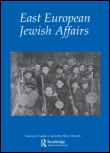
East European Jewish Affairs
Exploring the Rich Tapestry of East European Jewish HeritageEast European Jewish Affairs is a prominent scholarly journal published by Routledge Journals, Taylor & Francis Ltd, dedicated to exploring the intricate historical, cultural, and political dynamics of Jewish communities in Eastern Europe. With ISSN 1350-1674 and E-ISSN 1743-971X, this journal has been a critical platform for academic discourse since its inception in 1992, resuming publication after a hiatus in 2005. Although it is not an open-access journal, it provides vital insights into Jewish studies, engaging researchers, professionals, and students alike with in-depth analyses and discussions. The journal currently holds a Q4 ranking in multiple categories, including Cultural Studies, History, and Political Science and International Relations, reflecting its niche yet significant contribution to these fields. The 2023 Scopus rankings position it within the 34th percentile in History and the 10th percentile in Political Science, evidencing its specialized focus and the evolving nature of Jewish studies. For those investigating the unique social and cultural trajectories of East European Jewish communities, East European Jewish Affairs serves as an essential resource.

European Journal of Jewish Studies
Fostering Critical Inquiry into Jewish History and LiteratureEuropean Journal of Jewish Studies is a distinguished academic publication that offers a comprehensive platform for scholarly inquiry into Jewish studies, addressing critical intersections with cultural studies, history, literature, and religious studies. Published by BRILL, a leading academic publisher based in the Netherlands, this journal boasts a robust reputation supported by its impressive rankings and quartile classifications—Q3 in Cultural Studies, Q3 in History, Q2 in Literature and Literary Theory, and Q3 in Religious Studies as of 2023. With its convergence years spanning from 2007 to 2024, the journal serves as a vital repository of research that navigates the complexities of Jewish identity and culture through interdisciplinary lenses. Although it does not operate under an open access model, the journal's rigorous peer-review process ensures the publication of high-quality research essential for students, professionals, and academics alike. Engaging with this journal opens up pathways for critical dialogue and innovative contributions to the field, making it an essential resource for those invested in the rich tapestry of Jewish studies.

Nordisk Judaistik-Scandinavian Jewish Studies
Advancing Scholarship on Jewish Culture and History in the NorthNordisk Judaistik-Scandinavian Jewish Studies is a distinguished academic journal dedicated to the exploration of Jewish culture, history, and religious practices in the Scandinavian context. Published by the DONNER INSTITUTE FOR RESEARCH ON RELIGIOUS AND CULTURAL HISTORY in Finland, this journal has been an open access platform since 2016, allowing easy dissemination of knowledge and fostering scholarly communication among researchers, educators, and students. With a variety of subjects encompassing Anthropology, Cultural Studies, History, and Religious Studies, the journal has achieved commendable recognition, with its latest rankings placing it in Q2 in several categories according to the 2023 Scopus rankings. The journal's significant contribution to the field is evident through its impact, evidenced by its strategic position within its respective quartiles. By bridging interdisciplinary methodologies and Jewish studies within a Scandinavian framework, Nordisk Judaistik serves as an essential resource for those engaged in the complexities and nuances of Jewish heritage and identity in the region.
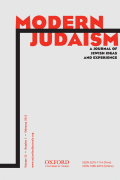
MODERN JUDAISM
Navigating the Complexities of Modern Jewish LifeMODERN JUDAISM is a premier journal dedicated to the multifaceted exploration of Jewish culture, history, and religious practice, providing a significant platform for scholarly discourse since its inception in 1981. Published by Oxford University Press Inc in the United States, this journal stands out with its diverse engagement across disciplines, reflected in its commendable 2023 category quartiles: Q2 in Cultural Studies and History, Q1 in Religious Studies, and notable rankings in Political Science and Sociology. With an impact factor that underscores its rigorous peer-review process and scholarly relevance, MODERN JUDAISM serves as an essential resource for researchers, professionals, and students alike, fostering an academic environment conducive to innovative ideas and comprehensive studies. Although not open access, the journal remains crucial for anyone looking to deepen their understanding of contemporary Jewish thought and its intersection with broader cultural and political currents. For further inquiry or submissions, please refer to the Journals Department at 2001 Evans Rd, Cary, NC 27513.

Jewish Historical Studies-Transactions of the Jewish Historical Society of England
Pioneering Research on Jewish Historical ContextsJewish Historical Studies - Transactions of the Jewish Historical Society of England is a premier scholarly journal dedicated to advancing the understanding of Jewish history in its diverse contexts. Published by UCL PRESS, this open access journal has been freely accessible since 2015, providing an invaluable resource for researchers, educators, and students alike. With an ISSN of 0962-9696 and E-ISSN 2397-1290, it features a wide variety of articles that delve into topics related to the historical, cultural, and societal aspects of Jewish communities. Located at University College London, the journal is committed to fostering interdisciplinary insights and encouraging critical discourse within Jewish studies. Its dedication to open access amplifies the visibility and dissemination of high-quality research, ensuring that vital scholarship reaches a global audience. As a vital platform for sharing cutting-edge research, Jewish Historical Studies plays a crucial role in the ongoing dialogue regarding Jewish history, heritage, and identity.
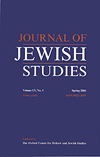
JOURNAL OF JEWISH STUDIES
Advancing Scholarship in Jewish StudiesJOURNAL OF JEWISH STUDIES, published by the Oxford Centre for Hebrew and Jewish Studies, stands as a distinguished platform for scholarly discourse in the fields of Jewish history, culture, literature, and religious studies. With its ISSN 0022-2097, this journal is recognized for its significant contributions to understanding Jewish heritage and thought, achieving commendable rankings in various categories, including Q1 in Literature and Literary Theory and Q2 in History and Cultural Studies, as of 2023. The journal fosters rigorous academic engagement and encourages researchers and scholars worldwide to explore the complexities of Jewish identity and its interconnections with broader historical narratives. Operating without an open access model, it nonetheless ensures a wide reach through its well-regarded reputation, making it an essential resource for anyone invested in Jewish studies. With a publication history spanning from 2002 to 2024, the journal continues to serve as an invaluable repository of knowledge and insight for students, researchers, and professionals alike.